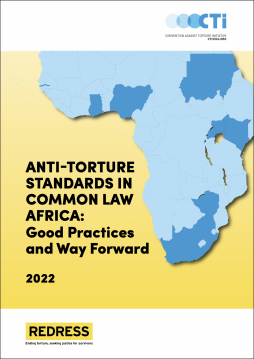Anti-torture Reforms in Common Law Africa
REDRESS is working in collaboration with the Convention against Torture Initiative (CTI) on a project to strengthen anti-torture standards in common law African States.
The Report
During Phase I of the project, CTI and REDRESS produced a report, Anti-Torture Standards in Common Law Africa: Good Practices and Way Forward, examining the anti-torture legislative and regulatory framework of eight States in common law Africa: The Gambia, Ghana, Kenya, Nigeria, South Africa, Sudan, Uganda and Zimbabwe. The report identified existing good practices and opportunities for legal and regulatory reforms to inspire action towards strengthening the domestic implementation of the UN Convention against Torture (UNCAT) across the region.
Background of the project
While most countries in Africa have ratified UNCAT, not many have passed the necessary legislation and regulations to make the protection against torture effective in practice. The introduction of anti-torture standards into States’ domestic legal frameworks, and their effective implementation, are crucial to ensure prevention, accountability, and redress for victims of these violations.
The introduction of effective legislation, regulations and policies addressing torture and other ill-treatment can also have a positive impact on the criminal justice system and broader State institutions. It can improve police efficiency, by encouraging good practices and adequate investigations. It can reduce or eliminate false allegations of torture, which adversely affect the credibility, work and efficiency of law enforcement institutions and judicial bodies. It can reduce corruption, strengthen the rule of law, and ultimately build public confidence in State institutions.
Next Steps
Phase II of the project aims to promote the report in Africa and deliver Legal and Policy Workshops to key stakeholders in two African States covered in the report. The Legal and Policy Workshops will be focused on the implementation of specific anti-torture standards among those highlighted in the report.
To discuss the project, contact [email protected] or [email protected].
Recent Publications: ·
- Anti-Torture Standards in Common Law Africa Factsheets
- Anti-Torture Standards in Common Law Africa: Good Practices and Way Forward

